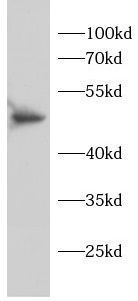Products
NFKB1 antibody
References
3
Category:
| Synonyms: | DNA binding factor KBF1 antibody, EBP 1 antibody, KBF1 antibody, NF kappa B antibody, NFKB p105 antibody, NFKB p50 antibody, NFKB1 antibody, NFKB1 antibody, p105 antibody, NFKB1 antibody, p105 antibody, p50 antibody, nfkb1a antibody, p105 antibody, p50 antibody | ||
| Catalogue No.: | FNab10334 | Reactivity: | Human, Mouse, Rat |
| Host: | Rabbit | Tested Application: | ELISA, WB, IHC |
| Clonality: | polyclonal | Isotype: | IgG |
- SPECIFICATIONS
- CITATIONS
- Product Name
- NFKB1 antibody
- Catalogue No.
- FNab10334
- Size
- 100μg
- Form
- liquid
- Purification
- Immunogen affinity purified
- Purity
- ≥95% as determined by SDS-PAGE
- Clonality
- polyclonal
- Isotype
- IgG
- Storage
- PBS with 0.02% sodium azide and 50% glycerol pH 7.3, -20℃ for 12 months (Avoid repeated freeze / thaw cycles.)
Immunogen
- Immunogen
- nuclear factor of kappa light polypeptide gene enhancer in B-cells 1
- Alternative Names
- DNA binding factor KBF1 antibody, EBP 1 antibody, KBF1 antibody, NF kappa B antibody, NFKB p105 antibody, NFKB p50 antibody, NFKB1 antibody, NFKB1 antibody, p105 antibody, NFKB1 antibody, p105 antibody, p50 antibody, nfkb1a antibody, p105 antibody, p50 antibody
- UniProt ID
- P19838
- Observed MW
- 50 kDa,105 kDa
Application
- Tested Applications
- ELISA, WB, IHC
- Recommended dilution
- WB: 1:200-1:2000; IHC: 1:50-1:500
Validated Images
 Jurkat cells were subjected to SDS PAGE followed by western blot with FNab10334(NFKB1 antibody) at dilution of 1:1000
Jurkat cells were subjected to SDS PAGE followed by western blot with FNab10334(NFKB1 antibody) at dilution of 1:1000
 Immunohistochemistry of paraffin-embedded rat lung using FNab10334(NFKB1 antibody) at dilution of 1:100
Immunohistochemistry of paraffin-embedded rat lung using FNab10334(NFKB1 antibody) at dilution of 1:100
- Background
- This gene encodes a 105 kD protein which can undergo cotranslational processing by the 26S proteasome to produce a 50 kD protein. The 105 kD protein is a Rel protein-specific transcription inhibitor and the 50 kD protein is a DNA binding subunit of the NF-kappa-B (NFKB) protein complex. NFKB is a transcription regulator that is activated by various intra- and extra-cellular stimuli such as cytokines, oxidant-free radicals, ultraviolet irradiation, and bacterial or viral products. Activated NFKB translocates into the nucleus and stimulates the expression of genes involved in a wide variety of biological functions. Inappropriate activation of NFKB has been associated with a number of inflammatory diseases while persistent inhibition of NFKB leads to inappropriate immune cell development or delayed cell growth. Alternative splicing results in multiple transcript variants encoding different isoforms, at least one of which is proteolytically processed.
IF: 5.1
- Journal:
- Molecular Neurobiology
- Author:
- Molecular Toxicology Laboratory, Department of Medical Elementology and Toxicology, Jamia Hamdard (Hamdard University), New Delhi, 110062, India
- Cited Date:
- 2024-01-05
- Product:
IF: 2.72
- Journal:
- Journal of Food Biochemistry
- Cited Date:
- 2021-09-03
- Product:
IF: 0.5
- Journal:
- International Journal of Morphology
- Author:
- Istinye University, Faculty of Medicine, Department of Medical Biology, Istanbul, Turkey
- Cited Date:
- 2023-12-08
- Product:



